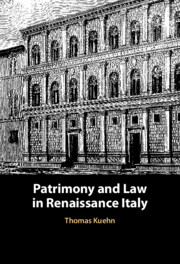Book contents
- Patrimony and Law in Renaissance Italy
- Patrimony and Law in Renaissance Italy
- Copyright page
- Contents
- Acknowledgments
- 1 Introduction
- 2 Bartolus and Family in Law
- 3 The Divisible Patrimony
- 4 Property of Spouses in Law in Renaissance Florence
- 5 Societas and Fraterna of Brothers
- 6 Fideicommissum and Law
- 7 Estate Inventories as Legal Instruments in Renaissance Italy
- 8 Prudence, Personhood, and Law in Renaissance Italy
- 9 Addendum
- 10 Conclusion
- Bibliography
- Index
4 - Property of Spouses in Law in Renaissance Florence
Published online by Cambridge University Press: 24 February 2022
- Patrimony and Law in Renaissance Italy
- Patrimony and Law in Renaissance Italy
- Copyright page
- Contents
- Acknowledgments
- 1 Introduction
- 2 Bartolus and Family in Law
- 3 The Divisible Patrimony
- 4 Property of Spouses in Law in Renaissance Florence
- 5 Societas and Fraterna of Brothers
- 6 Fideicommissum and Law
- 7 Estate Inventories as Legal Instruments in Renaissance Italy
- 8 Prudence, Personhood, and Law in Renaissance Italy
- 9 Addendum
- 10 Conclusion
- Bibliography
- Index
Summary
Customarily wives brought their husbands a substantial dowry, which the husband managed as another family resource. In fact, however, husbands were not free to do as they wished. If nothing else, they faced the powerful obligation to return the dowry and other uxorial property at the end of the marriage (generally by death of a spouse). They could even see a wife claim back her dowry during marriage on the grounds of mismanagement by the husband. The shared economy of the household could fracture, although a wife's claim might also have precluded claims and loss of property to outsiders. The legal problems were evident, and jurists were largely intent on protecting spousal rights.
- Type
- Chapter
- Information
- Patrimony and Law in Renaissance Italy , pp. 73 - 99Publisher: Cambridge University PressPrint publication year: 2022

